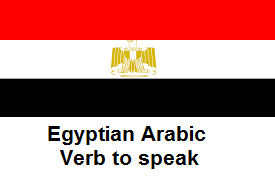Language/Egyptian-arabic/Grammar/Verbs-to-speak
Egyptian Arabic is the dialect of the Arabic language that is most commonly spoken in Egypt. As with any language, understanding the verb "to speak" is essential for basic communication. In Egyptian Arabic, the verb "to speak" is "lesh" (ليش).
Take some time to dive into these other pages after completing this lesson: Egyptian-arabic Grammar, Adjectives, Past Tense & Genitive Case.
Usage of the verb "lesh" in Egyptian Arabic[edit | edit source]
The verb "lesh" is used in Egyptian Arabic to indicate the act of speaking, either in general or in a specific context. For example, the sentence "Ana ba'lesh arabi" (أنا باعليش عربي) means "I speak Arabic." In this sentence, "lesh" is conjugated to match the subject pronoun "ana" (أنا), which means "I."
Conjugating the verb "lesh" in Egyptian Arabic[edit | edit source]
The conjugation of the verb "lesh" in Egyptian Arabic depends on the subject pronoun and the tense in which the sentence is written. In the present tense, for example, the verb "lesh" is conjugated as follows:
- Ana (أنا) "I": ba'lesh (باعليش)
- Inta (إنتا) "you (singular, informal)": ba'tlesh (باتليش)
- Inti (إنتي) "you (singular, feminine)": ba'tlesh (باتليش)
- Anta (أنتا) "you (singular, formal)": ba'tlesh (باتليش)
- Antum (أنتما) "you (dual)": ba'tlesh (باتليش)
- Hum (هم) "they (masculine)": ba'lesh (باعليش)
- Hunna (هن) "they (feminine)": ba'lesh (باعليش)
Note that in Egyptian Arabic, the conjugation of the verb "lesh" is often simplified in informal speech. For example, the conjugated form "ba'lesh" may be pronounced more like "bish" (بيش).
Common expressions using the verb "lesh" in Egyptian Arabic[edit | edit source]
In addition to its basic usage, the verb "lesh" is also used in a number of common expressions in Egyptian Arabic. Some of the most common expressions include:
- Leh? (ليه؟) "Why?"
- Leh yistghab arabi? (ليه يستغب عربي؟) "Why does he speak Arabic?"
- Leh yeb2a arabi? (ليه يبقي عربي؟) "Why does he stay in Arabic?"
Conjugation table of the verb "to speak" in Egyptian Arabic[edit | edit source]
Here is a table of conjugation for the verb "to speak" in Egyptian Arabic, showing the present tense, past tense, future tense, affirmative, and negative forms:
| Tense | Affirmative | Negative |
|---|---|---|
| Present | أتكلم (atu-kallim) | لا أتكلم (la atu-kallim) |
| Past | تكلمت (takallimt) | لم أتكلم (lam atu-kallim) |
| Future | سأتكلم (sa-atu-kallim) | لن أتكلم (lan atu-kallim) |
Proverbs in Egyptian Arabic that with the verb "to speak"[edit | edit source]
Here is a table of a few proverbs in Egyptian Arabic that use the verb "to speak," along with their transliteration and translation:
| Proverb (Arabic) | Transliteration | Translation |
|---|---|---|
| بتكلم عليك بي أحسن من بي تكلم عليك | betkallim aleik bei ahsen min bei tkallim aleik
|
"It's better for you to speak kindly to me than for someone else to speak ill of you to me." |
| الشاعر بيتكلم بالشعر و العامل بيتكلم بالعمل | al-shair beytkallim bil-shair wa al-amil beytkallim bil-amal
|
"A poet speaks with poetry and a worker speaks with his actions." |
| الخطاب يحصل عليه أول من يتكلم | al-khitab yahsel `aleih awal min yatkallim | "Speak first and you'll get the chance to make your point." |
Note: These are rough translations and may not be 100% accurate as the translation of proverbs can vary depending on the dialect and context. Feel free to edit this wiki page if you think it can be improved.
Other Lessons[edit | edit source]
- How to Use "فى" (There is)
- Adjectives
- Comparatives and Superlatives
- How to Use Have
- Use "بقدر" (can)
- Genitive Case
- Pronouns
- Prepositions
- Possession
- Plural

